-
Banff and Beyond
Tuesday, 6 September: Banff
This really was the unluckiest trip we have ever been on. It started on the plane, with not one, but two, sick passengers* (the other was a woman who suffered a panic attack when we first got on — it was like she knew), then, when we finally landed and found our Tour Rep, we ended up losing one of our group.
(* Incredibly, the sick woman I wrote about in my earlier blog ended up sitting next to me on the flight home. We got talking and she told me about her experience, and I told her my theory about her having been poisoned by the Flight Crew for refusing to move. We had a laugh over that, but I noticed that, during the entire flight home, she refused any food the Flight Crew offered her.)
For some reason, one of the couples in our group—Nancy and Robert—never made it to Calgary. There could have been many reasons for this, and many things that could have been done about it, but leaving 23 very tired strangers milling around in the Arrivals Hall at Calgary airport without any explanation for over an hour, and no apparent plan except to hold up the tour sign every time someone came down the chute, was not one I would have picked.
After an hour of no progress or information, one of our number suggested that maybe Bob and Nance weren’t coming, and that the other 23 people might benefit from moving on. The Tour Rep rebuffed her rather abruptly, and so we waited some more.
Eventually, even The Rep gave up, and we were allowed to board the bus and set off for Banff.
The Rep spoke to us through a microphone as the bus trundled along, telling us who she was, about the tour, where we were going and what we were going to see. Then she pointed out the scenery and started telling us about the history of the region, which was all well and good, but we were tired and road-weary and I, for one, just wished she’d shut the fuck up, while others began chatting among themselves.
“Do I hear voices?” the Rep asked from the front of the bus. “Or are they all in my head?”
The question hung in the air. Everybody stopped talking.
“I thought so,” The Rep said, and restarted her monologue.
I thought at the time that this was probably not the best move.
An hour later, we got to Banff.

Banff Banff is a small town of about eight thousand people, with several million tourists coming to visit every year. The main street is so pristine and tidy, and stylize to have a western-type feel, that it looks like a movie set. (Strangely, when you walk down the street the most prominent scent is caramelized sugar.) And I think that’s what they are shooting for. It’s all a bit slick, and there are restaurants and high-end hiking gear outlets packed so closely together you can’t always tell one from the other. It must be strange living there; all these restaurants, but they are always packed, so it would be hard to invite a date out for dinner. Where would you go?
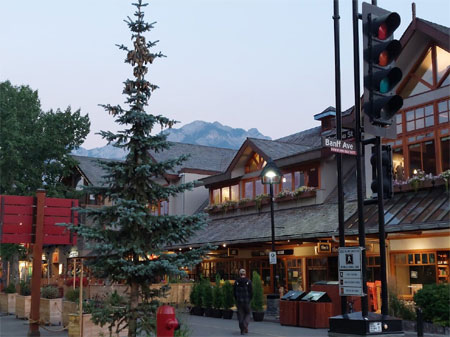
Main Street, Banff 
One of the coolest things about Banff was these fires. They were scattered around town, and went off and on at certain intervals. Our day in Banff (Wednesday, the 7th) was mostly taken up with a trip to Sulphur Mountain, where we rode a gondola to the summit. It offered spectacular views, but you could also see—just barely—smoke haze from a distant wildfire.

View from the top of Sulphur Mountain. 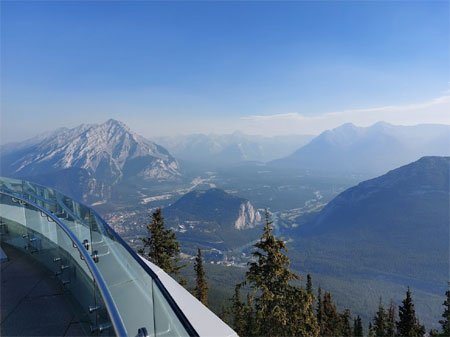
Another view. That’s not mist, it’s smoke. Thursday, 8 September: A day in the Rockies and a night in Jasper
Remember that smoke haze I mentioned earlier? That was Jasper on fire, which necessitated a change of plans.
Now, I cannot fault the Rep for this. It was unplanned and out of her control, and I thought she did an okay job of quickly rehousing 23 people in an area that was flooded with busloads of other tour groups similarly looking for alternative accommodation. However, this was an expensive holiday, and some people came on it specifically to see the Canadian Rockies, and we were cheated out of a full day of that.
Our new route took us, not up through the mountains to the scenic town of Jasper, but across the mountains to what can best be described as an industrial estate for second-rate hotels. In a short time, we left the mountains behind, and the scenery went from Sound-of-Music charming to the dreary landscape of The High Chaparral. Again, not the Rep’s fault, just saying’.
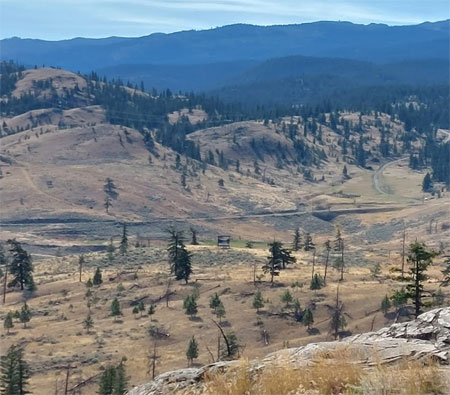
It has a certain stark beauty, but it’s not the Rockies. Along the way, however, we saw Lake Louise, arguably one of the most scenic places I have ever been. (Arguably because, well, New England in October is spectacular, and you can enjoy it without having to elbow your way through a thicket of tourists.) Our bus driver told us, when he dropped us off in the upper car park, that in the height of summer, the crowd of tourists reached up to there. As it was, the lakeside was mobbed, but we could at least walk the path from the car park to the lake without having to force our way through.
The scene that awaited us was stunning, and I could understand why so many people flocked there. Fortunately, the crowd was such that we could easily get to the shore, and walk along it until we were truly alone. That was, without a doubt, the highlight of the first part of the trip. It was all downhill from there.
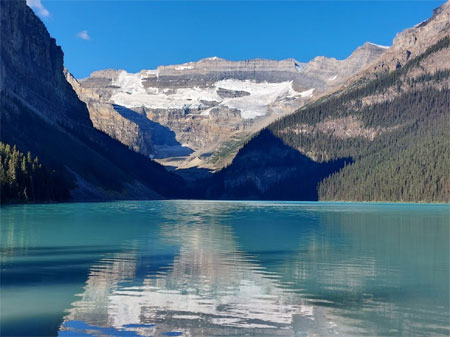
If I had to pick one photo that encapsulated the holiday, this would be it. The second scenic spot we stopped at was called Natural Bridge. Unfortunately, the name conjured up an image that reality couldn’t match. The most impressive thing about it, in my view, was that it looked a lot like the area around Lower Falls—my old swimming hole—with the carved shale and rushing water, but other than that, it was pretty underwhelming. If it hadn’t been pointed out to me, I wouldn’t have noticed that the water went through a sort of hole in the rocks, and if I had, I would have just thought, Hey, cool. I wouldn’t have built a car park and encouraged mobs of tourists to come and take photos.
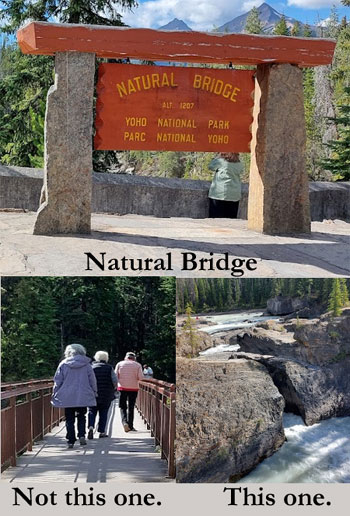
I took a photo: I went out on a point of rock—wide enough to be safe and familiar enough in its texture for me to navigate it without any difficulty—and got a good shot of the rushing, roiling water. Then I went back to the shore and my wife told me that, while I was taking the photo, The Rep was screaming at me to get back. I wondered what she hoped to accomplish by doing that; was she trying to startle me so I’d fall in?
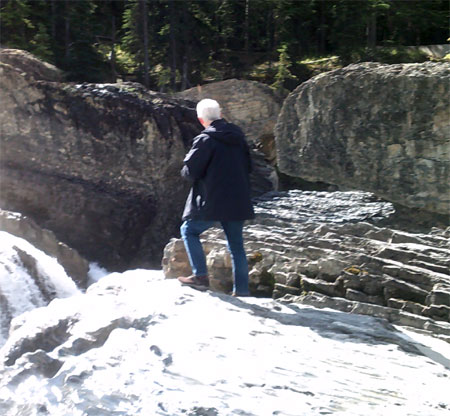
Me, getting yelled at. 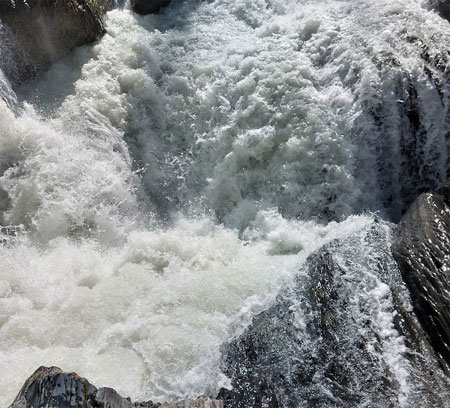
But I got a good photo. I thought little of it, but when we got rolling, she scolded me again, in front of the whole group. Really, what the fuck? I’m not 12, and she’s not my mom. Until then, I had been telling my wife that the jury was out as far as The Rep was concerned. After that, the jury came back with a definite, “We find the defendant guilty of being a dick-head,” verdict.
(At least I wasn’t the only one to be scolded. Two ladies in the group always boarded the bus on time. Just. They were never late, but because we were all on the bus waiting for them, The Rep scolded them for holding us up.)
The third stop of the day was most likely done because the company was contractually obligated to give the driver a break. We stopped at a small attraction that had been set up where the final spike of the Trans-Canada railroad had been driven in (by dignitaries, naturally; no mention of the thousands of immigrants who had actually built the thing). The Rep gave us some history of the site and the events it commemorated, then cut us loose for a twenty-minute break. No one was the least bit interested.

This didn’t really sell it to us, either. When we got to the back-up accommodation at a town called Kamloops, we were dumped at the hotel and The Rep said there were not enough rooms for everyone, so she and the driver were staying at another hotel some distance away. And then they left. I am certain she was lying; they just didn’t want to be too handy for us to complain to.
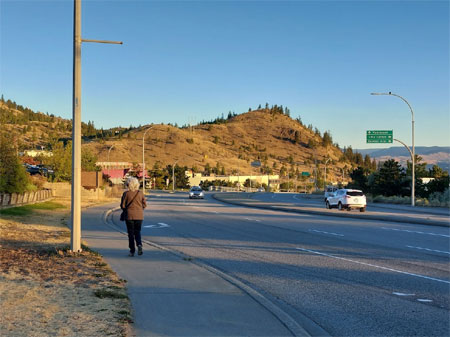
Kamloops, a bit of a let-down after Banff, if I’m honest. My wife and I ate dinner at a sports bar and got breakfast at a service station. Not exactly what we were expecting on a 5-star holiday.
Friday, 9 September: Off to Sun Peaks
Because we were not where we were supposed to be, and some people were not very happy about it, The Rep decided we should go to a Wildlife Refuge centre that she really wanted to go to…um, that she thought we would find interesting. Consequently, we went.

I got to see a Grizzly Bear up close, so it wasn’t a total loss. It was interesting, and a good diversion, but it was clear she made the choice because it was a favourite spot of hers and she wanted to go.
Back on the road, we were told we’d be at Sun Peaks around 4PM, and that a nurse would be coming around 5PM to test us all for COVID (a requirement for getting on the cruise ship), so we’d have to hang around and wait and then all queue up for the test.
However, went we got to the hotel in Sun Peaks, the nurse (let’s call her Florence Nightingale) was already there. She was chipper and chatty and ready for us and said she could do the tests before we checked in, then we could go off and do whatever we wanted to. That sounded good to us. My wife and I happened to be the first people in the lobby, so we sidled up and took our seats and Nurse Nightingale went to work.
Then The Rep came in, and she didn’t like what she saw.
“You made me look like a fool!” she said to Nurse Nightingale. “I told them you’d be here at 5.”
I don’t recall her reaction, but mine was, “How? All she did was make things more convenient for us.” In my mind, I said this: I wasn’t going to chance getting scolded again.
Anyway, The Rep went off in a huff and Nurse Nightingale commenced with the COVID test, which involved, literally, touching the inside of my nostril with a cotton bud, sticking it in an open test tube of solution, dumping a few drops on a test strip and then getting my details. After taking my name and email address (so she could send the All Clear that would get us on the cruise ship) she looked at the test strip (all of thirty seconds had passed by that time), pronounced me COVID-free, and sent the email. And charged me $70.
The test went so quickly that about 20 minutes (or $1,610.00 Canadian) later, all 23 of us had been tested and, unsurprisingly, found to be free of COVID. In exchanging notes, it became clear that everyone knew it was a farce, as well as a con on the tour company and the cruise line. The Rep was livid, but since we had all passed, and we were all happy about that, what was she going to do? Demand we all take another test? Seeing as no one liked her much, anyway, that would not have been a popular decision.
(Writing this up now, it occurs to me that, as COVID’s USP* is its ability to infect a person and make them contagious for up to ten days before they start showing symptoms, it is entirely possible that I had COVID at that time. Make of that what you will.)
*Unique Selling Point
Sun Peaks is the prettiest town I have seen this side of Bavaria. We went to dinner that night, dining on a sun deck, surrounded by mountains and hotels built to look like Swiss Chalets, feeling like we were in the Austrian Alps instead of British Columbia. And the people were so friendly. Our waitress was so chatty and companionable that I thought I was going to have to put her on our Christmas Card List. The hotel, unlike the one we had stayed at the night before, was grand, and it had a balcony with a spectacular view.
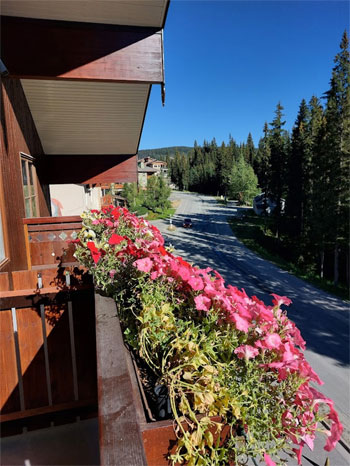
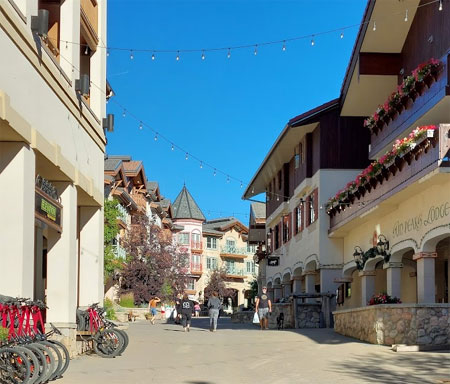
Sun Peaks, pretty, but not a lot to do, unless it’s winter and you ski. Saturday, 10 September: Off to Sea
The goal for this day was to get us to Vancouver and onto the Cruise Ship. According to The Rep, we had plenty of time, so we stopped off in the appropriately-named town of Hope for our midday break.
Unbeknown to The Rep, Hope was having some sort of festival. They had blocked off the streets, and a parade (the small-town variety; very cute) went by, and we had to detour to get near enough to the park (and public bathrooms) where she felt it was safe to let us off to find our own way. We did. The rest rooms were disgusting, but serviceable, the park was lovely, and we bought some crisps and a drink for lunch, then toured the amazing wood sculptures scattered around town (the kind made by applying a chainsaw to a log). They were very good and, apparently, the one of Sylvester Stallone as Rambo was famous (the movie was filmed around there somewhere.
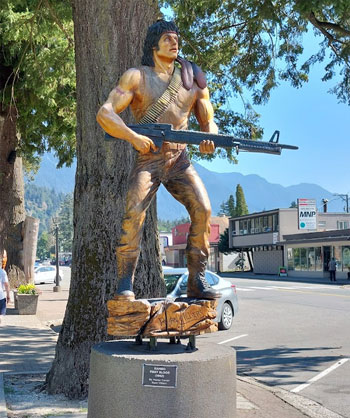
Visit Hope; meet Rambo. Meanwhile, in the background (just across the highway, as a matter of fact) the mountain was on fire.
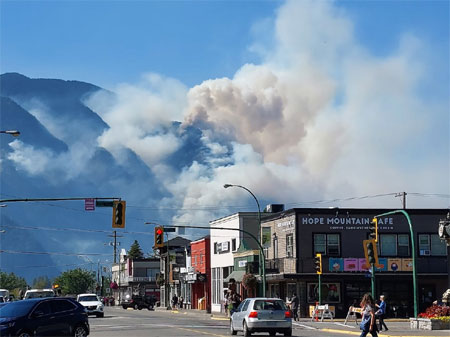
Seriously… The entire side of the nearest mountain was sending great billows of smoke into the crisp, morning air and, occasionally, a flicker of flame could be seen through it. We drove out of town on the road running right next to it, and the smoke and flames were incredible. We left the flames behind after a short while, but the smoke covered the landscape for many miles thereafter. And I don’t think the fire started that day, nor was it going to be put out by teatime, so those poor people must live in that smelly, smoky haze for weeks. What that must do to you, physically, emotionally, psychologically, I cannot imagine.
We arrived at the docks at about 2:30, which was the time The Rep was aiming for, but our processing took from 2:45 to 3:45, and the ship sailed at 4:00!!! We weren’t the last ones in line, either; we were near the end, but there were quite a few after us, and the US border thugs didn’t seem interested in processing us faster so we could make the boat. My guy (Officer Garcia), when I passed him both my passports (because I had been, up to that point required to show both) glared at me and demanded, “What’s this all about?” He was not amused.
As it was, we ran across the gangway as they were preparing to raise it. I did hear that everyone made it on board, but it was a close-run thing. We later heard that other passengers had boarded as early as 11:30AM. We really should have aimed to get there sooner.
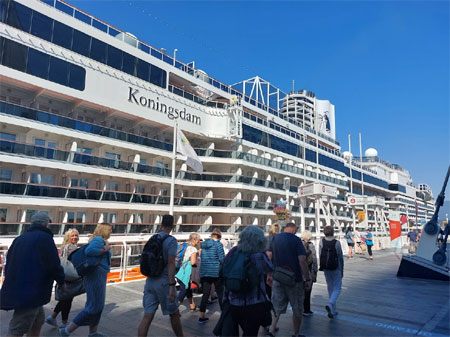
But we got there, and the best thing about it—aside from not having to move to a different hotel every night—was that we finally saw the backside of The Rep. No one liked her much.
Next up: Cruising